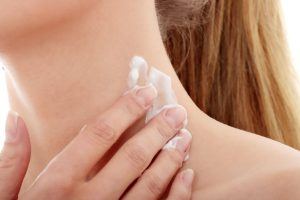 The term ‘eczema’ usually refers to atopic eczema, and affects people of all ages. If you or your child experience eczema, you will likely already be familiar with its most common symptoms:
The term ‘eczema’ usually refers to atopic eczema, and affects people of all ages. If you or your child experience eczema, you will likely already be familiar with its most common symptoms:
- Skin rash on the cheeks, inside the elbows and knees, around the eyes
- Dry and red skin
- Mild to extreme itchiness
- Agitation, problems sleeping
Eczema is not life-threatening and will often subside with age, but it is important to keep those symptoms at bay in order to relieve discomfort and avoid complications from skin infections, which can become severe.
What can I do to deal with eczema?
Eczema and other skin conditions are thought to have multiple different causes from inherited sensitivity and allergies to hormonal changes and a tendency for dry skin. When the cause is not well defined, it can be hard to find the right treatment, which can be very frustrating.
Using a regular emollient is first line in keeping up your skin defences and can often settle the inflammation caused by eczema.
At Dr Fox, though, we also have a number of eczema treatments (see below) that are prescribed by NHS skin specialists for active patches of inflamed skin that do not settle with only moisturising. Steroid ointments can be effective at treating such inflammation, but long-term use can also cause skin damage.
Eczema and dry skin treatments available from many outlets:
To help hydrate the skin:
- QV bath oil
- Calmurid cream
- Hydromol ointment
To soothe itchiness and soreness:
- Aveeno cream
- Doublebase gel
To create a protective layer against dryness and bacteria:
- Dermol lotion
- Dermamist spray
Eczema steroid treatment available from Dr Fox:
These should be used for mild to moderate eczema and used alongside an emollient above.
These can be provided by Dr Fox if you have been diagnosed with eczema and given steroid treatment for this in the past.
Further advice for eczema sufferers
1. Avoid the eczema triggers
Eczema can appear and disappear, flaring up in response to certain triggers, so being aware of and avoiding those triggers is an excellent way of reducing flare-ups.
Triggers you should be aware of:
- Abrupt changes in temperature & humidity (wind, cold, fever)
- Excessive sweating
- Allergens and irritants
- Food sensitivity
- Soaps, detergents and perfumes
- Dust and dust mites
- Pollens and other hay-fever triggers
- Animal fur or saliva
- Synthetic clothing and wool
- Dry skin
- Stress
But not all triggers can be avoided, so it’s imperative to deal with the symptoms of eczema as and when they appear.
2. Bathe using fragrance-free bath oils
A defined bath or shower regime can be very helpful in preventing eczema flare-ups. Lukewarm water is also the best way to moisturise dry and cracking skin, although the wrong soaps or bath oils can be an eczema trigger.
That’s why we recommend PH-balanced and fragrance-free QV Bath Oil, which gently cleanses and moisturises sensitive skin during a bath and doesn’t contain any potential allergens. Added to a baby or adult bath it helps to soak the dry skin and keep the moisture inside.
3. Use medical moisturisers (emollients)
Dry skin can be both a cause and symptom of eczema. Our skin is our natural protection against the microorganisms, chemicals and allergens but dry, dehydrated or broken skin loses its ability to resist elements that are normally harmless.
Moisturising is an essential part of eczema treatment to prevent dryness and cracking of your skin. It’s especially important to apply emollients immediately after a bath or shower (up to 3 mins after) so that the moisture gets trapped inside, rather than evaporating and drying the skin even further.
Use medical ointments, creams and lotions that don’t contain allergens or other potential irritants that could trigger an eczema flare-up. Aveeno cream contains natural substances that can calm skin inflammation, relieve itchiness, and reduce redness and swelling.
4. Apply a Protective Layer
Dermol lotion is also an emollient (moisturiser) but it has a few additional properties. Two active compounds (liquid paraffin and isopropyl myristate) trap water inside the skin and create a protective layer preventing evaporation. Meanwhile, two antiseptic substances (benzalkonium chloride and chlorhexidine hydrochloride) protect against bacteria and prevent further infections and irritations.
5. Rehydrate Your Skin
Skin rehydration is an effective way to counter the symptoms of eczema. Calmurid cream contains urea, which naturally occurs in your skin, and can absorb and retain moisture – but it can also ‘burn’ sensitive skin. Calmurid cream also holds lactic acid, which softens the affected areas, and improves your skin’s overall appearance.
Avoiding the triggers of eczema is essential to preventing flare-ups, as is keeping the skin moisturised. For further information on eczema and dry skin, its causes and how best to manage it, visit: allergyuk.org/information-and-advice/conditions-and-symptoms/35-eczema



